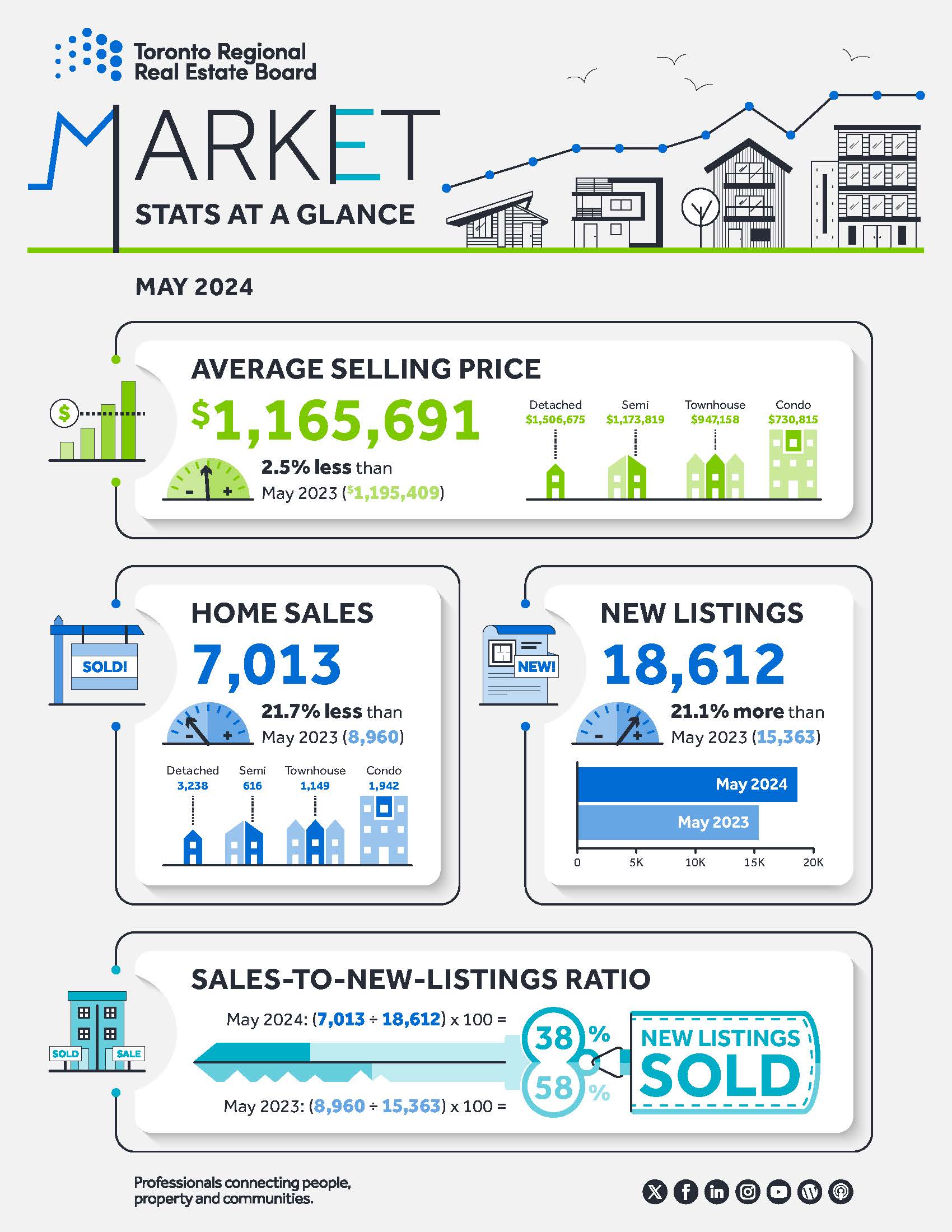Changes To The Canadian Capital Gains Tax

This summary is for informational purposes only and should not be considered tax or legal advice. Always consult a qualified professional before making financial decisions based on this information.

Key Federal Budget Capital Gains Measures
- Change:
- Effective June 25, 2024, the capital gains inclusion rate will increase from 50% to 66.67% for trusts and corporations. For individuals, this higher inclusion rate applies only to annual capital gains exceeding $250,000. The 50% inclusion rate will continue for gains below this threshold.
- Current Law:
- Currently, half of a capital gain is included in computing a taxpayer’s income, which also applies to capital losses.
- Impact:
- A higher portion of capital gains will be subject to income tax, increasing the tax burden on real estate investments, property sales, and capital gains within corporations (e.g., personal real estate corporations).
- Gains on Canadian residential property held for less than one year may be deemed business income (100% taxable) under the residential property flipping rule, unless an exception is met.

Increase to Lifetime Capital Gains Exemption (LCGE) for Entrepreneurs
- Change:
- The LCGE will rise to $1.25 million (from $1.016 million) for eligible capital gains, effective June 25, 2024.
- Impact:
- For those selling shares of qualified small business corporations (QSBC) or qualified farm and fishing property (QFFP), the increase in LCGE to $1.25 million will be beneficial.
Alternative Minimum Tax (AMT) Adjustments
- Change:
- Continued adjustments to AMT rules to align with changes in regular income tax calculations.
- The AMT allows fewer tax credits, deductions, and exemptions than ordinary personal income tax rules.
- Taxpayers pay the higher of regular tax or AMT.
- Impact:
- AMT considerations become crucial for planning capital gains realization and charitable contributions, influencing tax planning strategies.

Canadian Entrepreneurs’ Incentive
- Introduction:
- A new initiative beginning in 2025 reduces the capital gains tax rate to one-third on up to $2 million of qualifying shares.
- This incentive provides a capital gains inclusion rate of half the prevailing rate on up to $2 million in capital gains per individual over their lifetime.
- Impact:
While not applicable to professional corporations, this incentive promotes entrepreneurship by lowering the tax burden on qualifying share sales.

Strategic Planning Considerations
- Immediate Action: Evaluate the potential benefits of realizing capital gains before June 25, 2024, to optimize tax efficiency under current rates.
- Consultation: Engage with a tax advisor to navigate these changes effectively and tailor strategies to your specific financial situation.
- Long-term Planning: Assess the implications for retirement planning, estate management, and future investment decisions in light of these regulatory adjustments.

As Budget 2024 reshapes tax policies affecting real estate professionals and their clients, proactive planning becomes paramount. This overview is a high-level summary, and TRREB strongly encourages all members to seek expert professional advice to safeguard their financial interests amidst these evolving fiscal landscapes.
See More Information at the Government of Canada Website!
Home Buyers Experience Less Competition in May


The Toronto real estate market continued to see lower home sales in May 2024 compared to the previous year. This comes after a brief market upswing in the spring of 2023. Potential buyers are waiting for mortgage rates to come down before entering the market.

There’s some optimism, however. The number of new listings has increased significantly compared to last year. This suggests that existing homeowners are anticipating a future rise in demand, perhaps due to lower borrowing costs. With more properties available, buyers have more negotiating power when it comes to price.

The data confirms this. The average selling price in May 2024 was slightly lower than in May 2023. The MLS Home Price Index Composite benchmark also showed a year-over-year decrease. However, there was a small increase in average selling price compared to April 2024.

Experts believe that housing affordability will improve as mortgage rates go down. This will likely lead to more buyers entering the market, which could put upward pressure on prices again due to increased competition.

The Toronto Regional Real Estate Board (TRREB) is calling on all levels of government to work together to address the housing shortage in the Greater Toronto Area. They also emphasize the importance of timely completion of infrastructure projects to support population growth.
1st Interest Rate Cut by the Bank Of Canada in 4 Years

Bank of Canada reduces policy rate by 25 basis points
The Bank of Canada today reduced its target for the overnight rate to 4¾%, with the Bank Rate at 5% and the deposit rate at 4¾%. The Bank is continuing its policy of balance sheet normalization.

The global economy grew by about 3% in the first quarter of 2024, broadly in line with the Bank’s April Monetary Policy Report (MPR) projection. In the United States, the economy expanded more slowly than was expected, as weakness in exports and inventories weighed on activity. Growth in private domestic demand remained strong but eased. In the euro area, activity picked up in the first quarter of 2024. China’s economy was also stronger in the first quarter, buoyed by exports and industrial production, although domestic demand remained weak. Inflation in most advanced economies continues to ease, although progress towards price stability is bumpy and is proceeding at different speeds across regions. Oil prices have averaged close to the MPR assumptions, and financial conditions are little changed since April.

In Canada, economic growth resumed in the first quarter of 2024 after stalling in the second half of last year. At 1.7%, first-quarter GDP growth was slower than forecast in the MPR. Weaker inventory investment dampened activity. Consumption growth was solid at about 3%, and business investment and housing activity also increased. Labour market data show businesses continue to hire, although employment has been growing at a slower pace than the working-age population. Wage pressures remain but look to be moderating gradually. Overall, recent data suggest the economy is still operating in excess supply.

CPI inflation eased further in April, to 2.7%. The Bank’s preferred measures of core inflation also slowed and three-month measures suggest continued downward momentum. Indicators of the breadth of price increases across components of the CPI have moved down further and are near their historical average. However, shelter price inflation remains high.

With continued evidence that underlying inflation is easing, Governing Council agreed that monetary policy no longer needs to be as restrictive and reduced the policy interest rate by 25 basis points. Recent data has increased our confidence that inflation will continue to move towards the 2% target. Nonetheless, risks to the inflation outlook remain. Governing Council is closely watching the evolution of core inflation and remains particularly focused on the balance between demand and supply in the economy, inflation expectations, wage growth, and corporate pricing behaviour. The Bank remains resolute in its commitment to restoring price stability for Canadians.

Information note
The next scheduled date for announcing the overnight rate target is July 24, 2024. The Bank will publish its next full outlook for the economy and inflation, including risks to the projection, in the MPR at the same time.

Proposed Homeowner Protection Act, 2024 (Ontario, Canada)


Ontario Homeowners’ Protection Act 2024: Strengthening Consumer Protections and Preserving Heritage
The Ontario government is taking significant steps to bolster consumer protections for homeowners and homebuyers through a series of legislative measures aimed at curbing harmful business practices. In addition to ensuring that homebuyers can make well-informed decisions, the province is also focusing on preserving its heritage while supporting housing and infrastructure development. This comprehensive approach aims to create a fairer, more transparent real estate market while honoring the historical significance of Ontario’s communities.
Banning Consumer Notices of Security Interest Registrations
A pivotal aspect of the new measures is the proposed ban on consumer Notices of Security Interest (NOSI) registrations. NOSIs are notices that businesses can register on the Land Registry when they rent, finance, or lease equipment installed on a property, such as water heaters, furnaces, or HVAC units. These registrations can complicate property sales and financing for homeowners, as they often discover these liens only when they attempt to sell their home or seek additional financing.
Since the early 2000s, the number of NOSIs registered annually has surged from approximately 2,000 to over 58,000 in 2023. Currently, there are about 350,000 consumer and commercial NOSIs registered on Ontario’s electronic Land Registry. Misuse of these registrations often pressures consumers into negotiating costly buyouts, which can result in significant financial burdens. The ban on NOSIs aims to protect homeowners from such predatory practices and ensure smoother property transactions.

Protecting Buyers of New Homes
- 10-Day Cooling-Off Period
To further safeguard homebuyers, Ontario proposes a statutory 10-day cooling-off period for purchases of new freehold homes. This cooling-off period allows buyers to thoroughly understand their commitments and back out of the purchase if they decide it is not in their best interest. Currently, purchasers of new condos already benefit from such a cooling-off period. The proposed change aims to align protections across different types of property purchases, ensuring that all new homebuyers have the time and tools to make confident, informed decisions.
- Cancellation Disclosures
In an effort to boost homebuyer confidence, the government intends to introduce regulatory changes that would require public disclosure of a builder’s history of cancelling purchase agreements for new freehold homes. This follows public consultations conducted in summer 2023. Presently, buyers can access a builder’s record of cancelling condo purchase agreements on the Home Construction Regulatory Authority’s (HCRA) website. Extending this transparency to freehold homes will help buyers make better-informed decisions and trust in the reliability of their builders.
- Combating Illegal Building and Selling
Ontario is also targeting illegal building and selling practices. Homes constructed by unlicensed builders who bypass necessary regulatory requirements often have more defects and pose higher risks to buyers. These homes are not enrolled with Tarion, the body overseeing Ontario’s new home warranty and protection program, leading to significantly higher claims. On average, Tarion pays out $45,928 per illegally built home compared to $19,563 for legally built homes.
The province plans to hold consultations in early 2025 to develop strategies to combat illegal building practices. These consultations will focus on creating a fairer market for compliant builders and ensuring better quality homes for buyers of new freehold homes.

Enhancing Protections for Condo Owners
- Expanding the Condominium Authority Tribunal’s Jurisdiction
Condominium communities, home to over a million Ontarians, often face unique challenges and disputes. The Condominium Authority Tribunal, which primarily resolves disputes between condo corporations and owners, is set to expand its jurisdiction. Ontario plans to initiate consultations on this expansion, beginning with issues related to owners’ meetings. This phased and thoughtful approach aims to address the evolving needs of condo communities.
- Consultations for Condo Protections
The government will also consult on initiatives to strengthen protections for condo owners and buyers. These consultations will explore improvements to status certificates, disclosure statements, handling material changes during construction, and records access. The goal is to enhance operational and financial transparency for condo owners while minimizing the administrative burden on condo corporations.

Supporting Municipalities and Property Owners in Conserving Heritage
Ontario is committed to preserving its rich heritage while facilitating housing and infrastructure development. Proposed amendments to the Ontario Heritage Act would give municipalities until January 1, 2027, to complete the evaluation of properties on their municipal heritage registers. This extension aims to ease administrative pressures on municipalities, allowing them more time to focus on conserving historically significant properties.
Additionally, the proposed amendments would provide clarity on how legislated timelines and requirements apply to listed properties, offering greater certainty to both municipalities and property owners.
Building More Housing Near Transit
To capitalize on Ontario’s substantial investments in transit infrastructure, the province is proposing measures to make it easier and faster to build mixed-use housing near transit hubs. This initiative aims to maximize the benefits of transit-oriented communities, providing continued certainty for building partners and fostering the development of vibrant, accessible neighborhoods.
The proposed legislation would exempt designated transit-oriented community lands from certain provisions of the Planning Act related to minister’s zoning orders, facilitating quicker and more efficient development processes.

Conclusion
The Ontario government’s comprehensive approach to strengthening consumer protections, supporting heritage conservation, and facilitating housing development represents a significant step forward for homeowners and homebuyers. By banning harmful business practices like NOSI registrations, introducing cooling-off periods, enhancing transparency, and combating illegal building, the province aims to create a fairer and more transparent real estate market.
Moreover, the focus on preserving Ontario’s heritage and promoting transit-oriented development underscores a balanced approach to growth and conservation. These measures, combined with enhanced protections for condo owners and thoughtful expansion of the Condominium Authority Tribunal’s jurisdiction, reflect Ontario’s commitment to supporting its residents and ensuring a thriving, equitable housing market.
For more detailed information and ongoing updates, homeowners and buyers are encouraged to refer to official resources at Ontario.ca or consult with real estate professionals and legal experts. Staying informed is the best way to navigate these changes and make confident, well-informed decisions in Ontario’s dynamic real estate landscape.



 Facebook
Facebook
 X
X
 Pinterest
Pinterest
 Copy Link
Copy Link